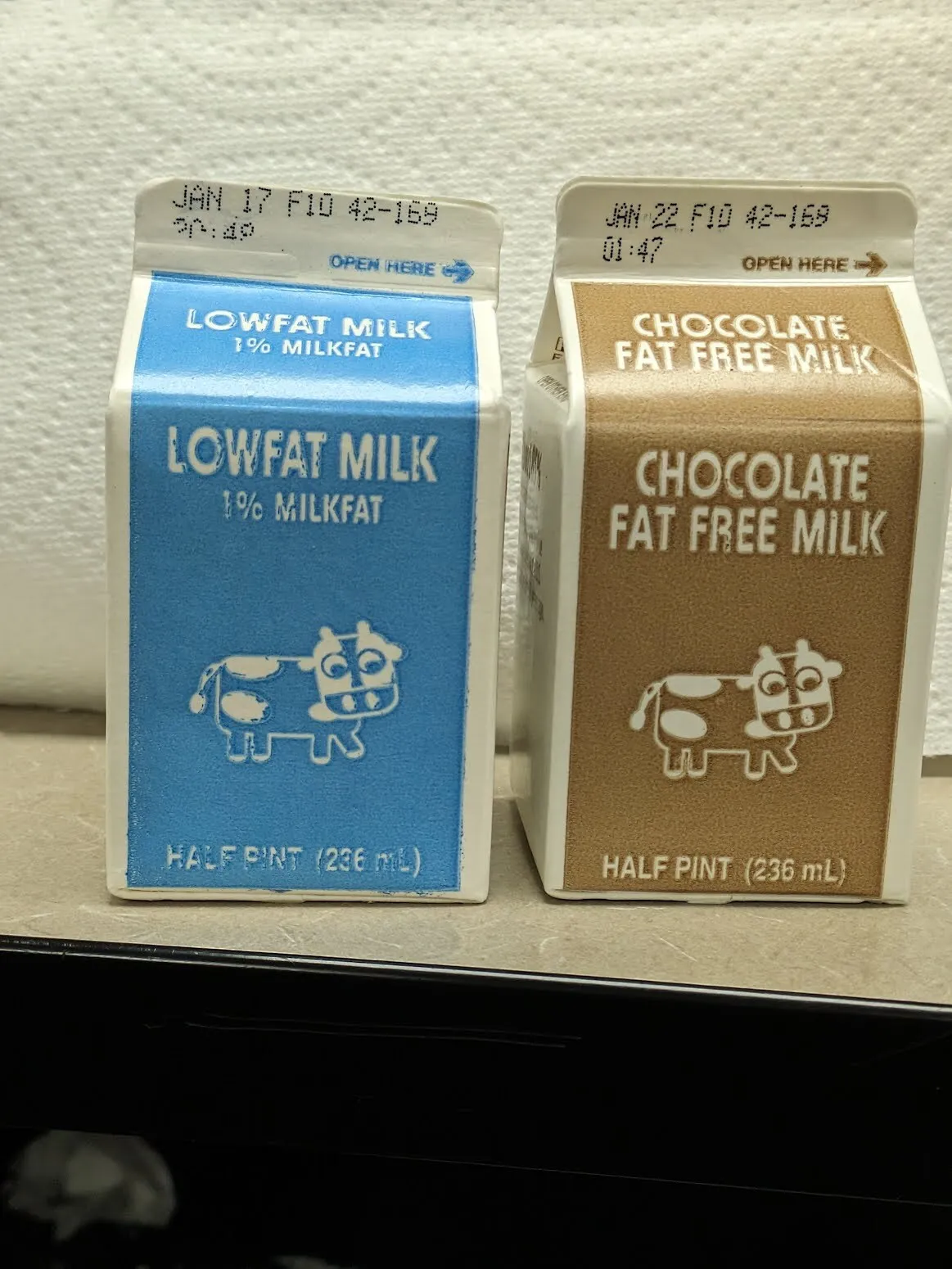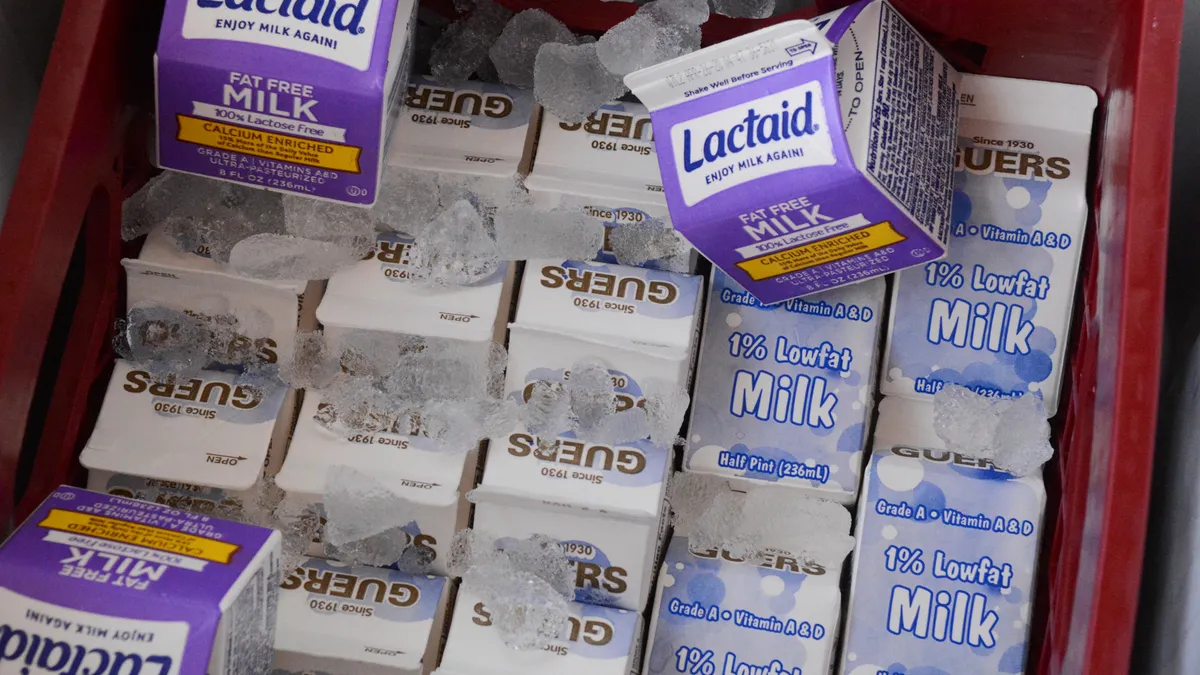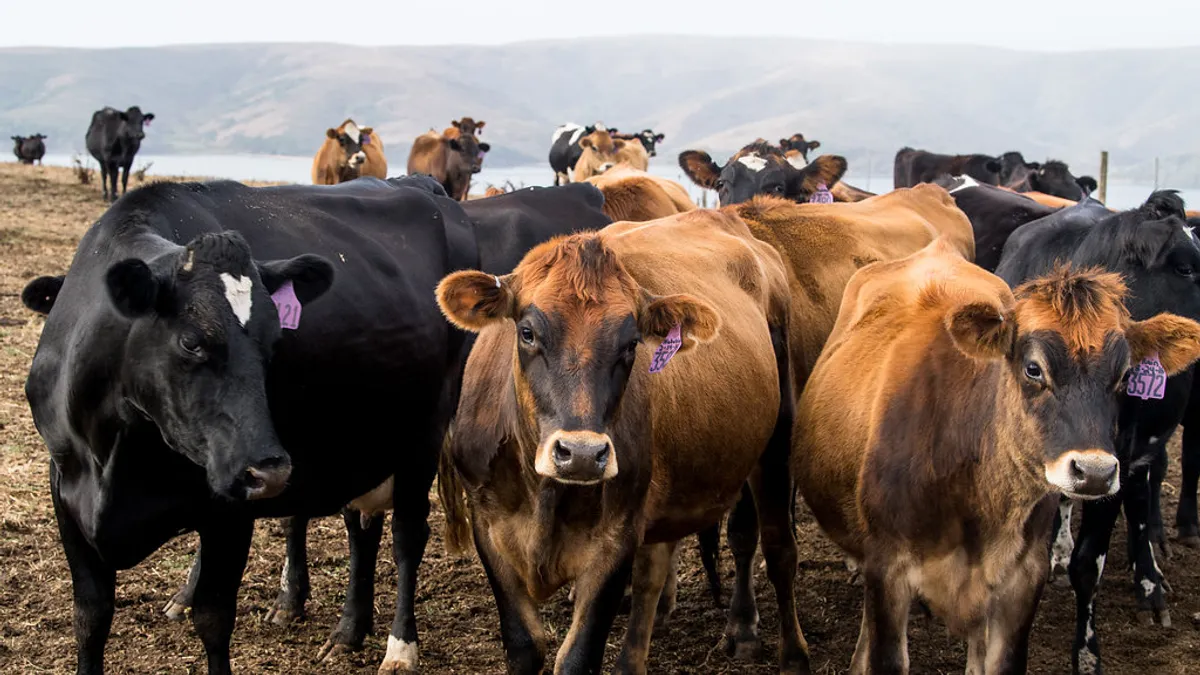One of 2023's wide-reaching packaging woes is carrying over into the new year. Domestic dairies, schools and others are still dealing with the lingering months-long half-pint carton shortage.
While predictions are emerging that the problem won't be solved before the end of this school year, some degree of assistance now is in place. And some sources have pointed to a possible cause for the ongoing supply disruption: Pactiv Evergreen's decision last year to shut down its Olmsted Falls, Ohio, converting facility that produced these 8-ounce cartons.
While some observers initially speculated that a paperboard shortage caused the supply chain disruption, that theory has largely fallen to the wayside. The shuttered Olmsted Falls plant is known to have produced a significant volume of the nation’s 8-ounce cartons, which are especially used by dairies that service schools as well as healthcare facilities and other institutions. The shortage also affects other beverage suppliers who use that size container, such as for juice or iced tea.
"That plant in Ohio, that's where a lot of us were getting our product from. And when that closed, it kind of went" downhill, said Scott Stoner, vice president of operations at New Jersey-based Cream-O-Land Dairy. "We're still in [the shortage]."
A former employee at the Olmsted Falls plant, who asked to remain anonymous as they were not authorized to speak publicly, stated that the 8-ounce carton supply chain disruption is directly related to that facility's closure. The employee worked in various positions on the carton lines up to last year, and estimates, based on their knowledge of each line’s product volumes, that Olmsted Falls produced about 18 million 8-ounce cartons per week.
Around the time of the Olmsted Falls closure in June, employees at other Pactiv Evergreen carton manufacturing facilities "were already struggling" due to apparent internal issues like labor or recruitment, said the former employee, based on conversations with employees at other facilities. "Some of them already were on a six-day work week, some of them even seven," the former employee said.
Pactiv Evergreen did not respond to a request for information about the Olmsted Falls plant and the carton supply disruption causation.
Bye-bye, branding
Pactiv Evergreen said in an emailed statement on Wednesday that it has upped its carton production to maximum capacity. Although the shipped volumes are greater than during the depths of the shortage, they're still not meeting the original demand, Stoner confirmed. And there's a catch with the additional 8-ounce cartons: They're generic, without any identifying branding.
"They're shipping that all over the United States. It's the same container for all of us. It doesn't have our logos," he said. "Right now, 1% chocolate and 1% white [milk] is coming out in generics. And they're just adding a skim half-pint that's going to be generic that we're just signing off on this week."

Pactiv Evergreen said in the statement that the generic containers are part of its response “to minimize supply chain complexity." The company also said it continued to produce the cartons at maximum capacity even "while schools were closed for the holidays to allow our customers to build inventory," and it thanked customers for their patience.
"We will continue to work with those closest to milk consumption — the dairies and dairy food processors that directly service schools — to support their forecasting accuracy and encourage them to build inventory during the summer months to prevent this situation from reoccurring," the statement said.
The generic cartons are providing some of the first relief for Cream-O-Land since it first experienced supply snags in September and began exploring solutions. Stoner has examined buying from domestic and foreign packaging suppliers, putting half-pint portions of milk into larger containers, using large milk dispensers instead of cartons and moving around supply to various locations in their service area — much of the East Coast and parts of the Caribbean — that had more half-pint cartons available. Those methods have proven arduous and costly.
Cream-O-Land's multiyear sole-supplier contract with Pactiv Evergreen expired in December. The packaging company did not request a contract renewal or negotiations because of the uncertainty in its carton supply, Cream-O-Land was told, and instead will operate indefinitely on an as-needed basis. In addition, "they lowered our price, which is hard to believe," Stoner said
While no other lone company was able to fully supply the volume of half pints that Cream-O-Land needed to fill the gap left by Pactiv Evergreen, the dairy has had some successful discussions with multiple other companies. Elopak, in particular, has been helpful in providing additional cartons, which arrived at Cream-O-Land this week, Stoner said. Other packaging suppliers are testing the dairy's product in their packaging, and Cream-O-Land hopes to have additional suppliers on board by the end of this month — but shipment delays are pervasive across suppliers.
"We're surviving. ... We're running week-to-week," he said. "In December, we were running day-to-day. The last week, maybe the last two weeks, in December we finally got enough packaging to where we weren't running day-to-day."
Tetra Pak is another leading domestic carton producer, and the company therefore received many requests for assistance — from both existing and potential customers — since the shortage occurred last year. Seth Teply, president and CEO, Tetra Pak U.S. and Canada, suggested via email on Wednesday that the company had limited ability to take on new customers.
"Our existing customer base demonstrated an increased demand for carton gable top packaging in 2023. As a result, we have remained focused on fulfilling our existing customers’ contracted orders," Teply said.
He noted that Tetra Pak still is experiencing elevated demand for half-pint gable top cartons. Additionally, the company has seen growing interest in its shelf-stable milk cartons.
Schools have been particularly struck by the 8-ounce carton supply trouble because they must supply milk at breakfast and lunch to meet federal requirements, and the sector heavily uses half pints. At this point, "the situation remains fluid," but any milk shortages in schools — which are solely due to packaging and not milk supply — appear to be "sporadic and localized," said Matt Herrick, senior vice president of public affairs and communications at the International Dairy Foods Association. "We are therefore cautioning all stakeholders who contact us not to panic."
Pactiv Evergreen’s generic cartons have helped to lessen the supply crunch to some degree in recent weeks, he said.
"This has helped processors have at least enough stock on hand to fulfill immediate orders. Lead time remains very challenged, however," Herrick said. "We are asking processors to flag any continued disruptions so that we can help to triage the situation as quickly as possible while we look for short-term solutions until the shortage finally eases."
Plant problems
Pactiv Evergreen announced on March 6, 2023, that it was taking restructuring actions, including closing the Olmsted Falls converting plant and a pulp and paper mill in Canton, North Carolina, both of which largely shuttered in June. A collective 1,300 jobs were eliminated, about 160 of which were in Olmsted Falls. The company also said it would explore "strategic alternatives'' for its mill in Pine Bluffs, Arkansas, and for an extrusion facility in Waynesville, North Carolina, although no firm plans have been announced.
Pactiv Evergreen told employees that the closures were due to decreased demand, according to the former Olmsted Falls employee. But some employees doubt that reasoning, especially in light of the resulting carton disruption just months later, and instead question whether union relations issues contributed to the closures, the source said.
The United Steelworkers union represented the Olmsted Falls, Canton and some other Pactiv Evergreen facilities under the same master contract, and they all negotiated together, according to the former employee. In late 2022, they rejected the most recently proposed contract, Olmsted Falls' and Canton's first time doing that in at least 50 years, according to the former employee. Several rounds of negotiations resulted, and Pactiv Evergreen reached a deal with Olmsted Falls, but not with Canton, by the time it announced the closures in March 2023, the former employee said. USW did not respond to a request for comment on contract negotiation timing by publication time.
Anonymous public reviews on Glassdoor purported to be written by Olmsted Falls and Canton employees also reference the facility closures, with questions raised about possible union issues and whether Pactiv Evergreen closed facilities before employees could strike. And a "retaliation" case at the Canton facility was filed in 2022 with the National Labor Relations Board, which investigates complaints of unfair labor practices or workers' right to organize.
Pactiv Evergreen did not respond to comment requests regarding labor.
Resolving a fluid situation
Pactiv Evergreen released a statement to CNN in November saying that it had faced "significantly higher than projected demand," suggesting that led to the shortage. But some people question whether that explanation passes the sniff test.
"It's exactly the same demand," Cream-O-Land’s Stoner speculated. "I think somebody just screwed up."
While the generic half-pints have provided some relief, Stoner anticipates the supply problem will not be completely resolved anytime soon.
"It's obviously not going to get back to normal this school year,” he said. “Maybe for next school year. Maybe.”
That aligns with Tetra Pak's outlook on the timing for a full resolution.
"We expect demand will continue at elevated levels throughout the remainder of the current school year and we have continued to allocate overtime shifts to increase production," Teply said.
But IDFA's Herrick espouses a more optimistic outlook: "All signs continue to point to the supply challenge easing by late winter or early spring without any further disruptions, unexpected supply shocks, or other unforeseen events."
The U.S. Department of Agriculture's Food and Nutrition Service spotlighted the carton shortage in an Oct. 25 memo, noting that some schools nationwide were experiencing difficulty with getting their supplies of milk due to packaging supply chain issues. Members of Congress — including Senate Majority Leader Chuck Schumer, D-N.Y., and Rep. Mark Molinaro, R-N.Y. — have called on USDA to take action regarding the carton and milk backups.
A USDA spokesperson confirmed via email on Thursday that the agency's Food and Nutrition Service continues to assist school districts experiencing milk supply disruptions due to the carton issue. FNS has communicated with representatives from half-pint milk carton suppliers to help identify solutions, according to the spokesperson, and "will continue to address the situation using available authorities and resources."
The last guidance FNS issued came on Oct. 25, in which it reiterated that school lunch program operators should try to meet the federal milk requirements "to the greatest extent possible." During the "emergency period" operators can use alternative forms of milk or forego milk if necessary.
The spokesperson also pointed out that equipment grants are available for school lunch program operators, and schools potentially could use the funding to shift to alternative methods of milk distribution, such as steel milk dispensers.
Certain state legislators and school districts are taking longer-term action that they hope prevents this problem from happening again. In December, New York state Assemblywoman Marianne Buttenschon and state Sen. Joseph Griffo introduced complementary legislation in their respective branches to address the milk carton shortage. It would establish a pilot program for Oneida County school districts to purchase self-serve milk dispensers and bulk milk orders, for which they would receive reimbursements.
Buttenschon said via email that each school district is independently dealing with the milk concerns. But if the pilot is successful, the hope is for the entire state to adopt such a program.
Despite the one proposed solution, the assemblywoman notes that legislators are open to other stakeholder ideas. "Our children’s health must always be a priority and ensuring that they have the option of fresh milk during their school day will always be a priority to me," she said.
While players across the supply chain continue wading through the enduring carton supply situation, Stoner said he has learned a huge lesson.
"I will never have [only] one supplier ever again,” he said. “Never."




















